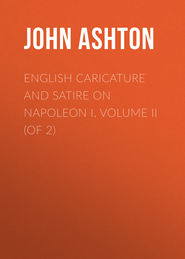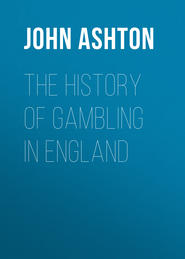По всем вопросам обращайтесь на: info@litportal.ru
(©) 2003-2024.
✖
Eighteenth Century Waifs
Настройки чтения
Размер шрифта
Высота строк
Поля
And again, in the same paper, 24th of August, 1786, p. 2, col. 3, is another paragraph respecting him:
‘Comte de Cagliostro has declared he will hold no intercourse with any of Le Sieur Breteuil’s messengers from France, except in the presence of Lord George Gordon. The gang of French spies in London, who are linked in with M. de Morande, and the Sieurs Barthelemy, Dazimer, Cambise, and the Queen’s Bastile party at Paris, are trying the most insiduous arts to entrap the Comte and Comtesse, and have the effrontery and audaciousness to persecute them publicly, and vilify them even in this free country, where these noble Strangers are come to seek protection in the arms of a generous people. The friendship and benevolence of Comte de Cagliostro, in advising the poor Prince Louis de Rohan to be upon his guard against the Comtesse de Valois, and the intrigues of the Queen’s faction, (who still seek the destruction of that noble Prince) has brought upon the Comte and his amiable Comtesse the hateful revenge of a tyrannical Government. The story of the Diamonds has never been properly explained to the Public in France. It would discover too much of the base arts practised to destroy Prince Louis, and involve in guilt persons not safe to name in an arbitrary kingdom.’
This airing of private grief in public extorted some strictures in a letter in the Morning Post, of 29th of August, 1786, in which it was suggested, generally, that foreigners should wash their dirty linen at home. But Monsieur de Morande, editor of the Courier de l’Europe, published many assertions, be they facts, or fiction, relative to Cagliostro, and he once more blossomed out into print in his old champion, the Public Advertiser (vide that newspaper, 5th of September, 1786, p. 2. col. 1), translated in the number of 7th September. In this curious letter, he adverts to his adversaries’ slanders, and the following singular passages occur:
‘Of all the very good stories which you relate at my expense, the best, without comparison, is that of the pig fed with arsenic, which poisoned the lions, tygers, and leopards of the forests of Medina. I am going, Mr. Railer, to give you an opportunity of being witty on a perfect comprehension of the fact. You know that, in physics and chymistry, reasoning proves but little, ridicule nothing, and that experiment is all. Permit me, then, to propose a small experiment to you, of which the issue will divert the public, either at your expense, or mine. I invite you to breakfast with me on the 9th of November next, at nine o’clock in the morning. You shall furnish the wine, and the appendages. For myself, I shall only furnish a single dish, after my own fashion – it shall be a sucking pig, fattened after my method. Two hours before breakfast, I shall present you the pig alive, fat and healthy. You shall order it to be killed as you please, and prepared, and I shall not approach until it is served at the table. You shall cut it into four equal parts, you shall chuse that which most flatters your appetite, and I shall take that which you please. The day after that of our breakfast, one or more of four things will happen. Either both of us shall die, or we neither of us shall die, or you shall die and I survive, or I shall die and you survive. Of these four chances I give you three, and I bet you 5000 guineas, that, on the day after our breakfast, you shall die, and I be perfectly well. You must either accept of this Challenge, or acknowledge that you are an ignorant fellow, and that you have foolishly ridiculed a thing which is totally out of your knowledge.
‘If you accept of this Challenge, I shall instantly deposit the 5000 guineas with any banker that you please. You shall do the same in five days, during which time you shall have leave to make your supporters Contribute,’ &c.
Monsieur de Morande’s reply was published immediately following the above letter. It is, like Cagliostro’s, too long for insertion; but its gist is, that he intends to unmask the pretender, and that he utterly declines to attend a poisoning match. He writes:
‘I solemnly defy you to contradict them’ (i. e., his assertions as to Cagliostro’s quackeries and adventures); ‘and that I even offer, without croupiers or supporters, to make you another wager of five thousand guineas that I shall compleatly unmask you.
‘But, Monsieur le Comte, I shall not put my foot in your house, and shall not breakfast with you myself. I am neither abject enough to keep you company, nor will let it be suspected for a single moment.
‘You clearly conceive that such an interview ought not, nor can be, within your doors; you would be liable to be found guilty of criminal practises, in case of accident. This your Council had not foreseen.
‘As no tavern would permit such infamous scenes to pass under its roof as those you propose, you must, Monsieur le Comte, return once more to the booth; and worthy disciple of Locusta,[113 - Locusta, or, more correctly, Lucusta, was a celebrated poisoner. She was employed by Aggripina to poison the Emperor Claudius, and by Nero to kill Britannicus. For this she was most handsomely rewarded by Nero; but was executed for her crimes by Galba.] choose in London a public place to make an open-air exhibition of your talents.’
And like the scorpion, which carries its sting in its tail, he adds a foot-note, which refers to the heading of his letter:
‘M. de Morande’s Answer to Don Joseph Balsamo,self-created Count of Cagliostro, Colonel in the Service of all the Sovereign Powers in Europe.’
‘If it was not the case, it would be very singular to have seen, in the year 1777, M. Cagliostro calling himself in England Colonel of the Third Regiment of Brandenbourg, and, afterwards, in Russia, Colonel in the Spanish Service; for which, however, he was reprimanded by the magistrates of Petersburgh. Having forgot to take his Commission with him, he could not exhibit proofs, and was obliged to put down his regimentals. This check on his conduct made him abscond from Petersburgh. Every Russian nobleman in London knows this anecdote, and, without presuming to mention names, we trust that this will be found to be the case upon enquiry.’
To this letter Cagliostro replied with another in the Public Advertiser (p. 2, col. 1) of September 9, 1786, in which he repeats his challenge, and declines to sit down to breakfast with a carnivorous animal.
De Morande, of course, could not be silent, and replied in the Public Advertiser (p. 2, col. 1) of September 12, 1786. He reiterated the charges he made against Cagliostro in the Courier de l’Europe, saying, among other things, ‘I have said that you were in England in the year 1771, under the name of Balsamo, and that you were then a needy, as well as a very indifferent painter; that twenty persons, at least, are ready to prove it. You take no notice of this second assertion, which becomes serious, by the oath you have taken under that name, of which I have a legal copy in my possession.
‘I have said that you have made your appearance under another name, that of Cagliostro, in the year 1777. I have several affidavits, amongst which there are some of your own, which authenticate very curious anecdotes concerning you; to this you have replied nothing.
‘I have said that you falsely pretended then to be a Colonel of the third regiment of Brandenbourg; that you had, at that time, a law-suit in the Court of Queen’s Bench, about a certain necklace, and a gold snuff-box, which you asserted to have been given Madame la Comtesse, but which you were obliged to return, and pay all Costs, on the Clear proofs given by your adverse party, that you obtained them under false pretences. No reply has been made to this.
‘I have added that, were you curious to try the same experiment now, a new Act of Parliament, which you and your fellow-adventurers have rendered very necessary, would certainly have caused you to be sent to the Thames.[114 - i. e., to serve on the convict hulks there, to dredge the Thames. The treatment on board was based on good principles; those convicts who were well-behaved had remission of sentence, those who were recalcitrant had unmerciful punishment.] To that direct and very clear observation you have not replied a single word.
‘I have said that you were ordered by the Police in Russia, not to presume to take the name of a Colonel in the Spanish service, and to strip off your Spanish regimentals. I have given you an opportunity to vindicate yourself, by giving to understand, that there is not a Russian nobleman in London who would not certify this fact. I might have added that I have in my possession the most respectable authority to say so. What have you said in reply to this?
‘I have roundly asserted that I am in possession of proofs, that you are an impostor under every possible denomination; that you have not only no pretension to any title, but not even to the rank of a sergeant. Shall this remain likewise unanswered?
‘I am sorry to be obliged once more to name Messrs. B. & C. Bankers, to prove that your pretensions to lay a wager of 5000 guineas, are as well grounded as your pretensions to the title of a Count, or an Alchemist. It is a fact, that you humbly offered to pledge in their hands the watch, of which the too long, and too much, deluded Cardinal de Rohan made you a present. It is likewise a fact that they disdainfully refused it. Your proposing, after this, a wager of 5000 guineas is probably no more than a new pretence to obtain credit, as you have formerly (in pretending to make great quantities of gold) obtained small sums, and little diamonds to make larger, which you afterwards declared had been given to Madame la Comtesse. Those proofs, I repeat to you, are in my possession; they are all fully authenticated, and I will make good every one of my assertions.’ And he winds up his letter with expressing ‘the satisfaction I feel in having furnished the world with sufficient proofs to convince them that you are THE GREATEST IMPOSTOR OF THIS OR ANY OTHER AGE.’
This ended the correspondence, for the general public were beginning to meddle in it, and the editor of the Public Advertiser would only open his pages to the principals in this duel. This finished Cagliostro’s career in England. He had tried to sell his quack medicines, his Egyptian pills, but the charm was broken, and he quitted England for the Continent in May, 1787, leaving his wife behind, with sufficient means, under the guardianship of the De Loutherbourgs. She afterwards sold all up, and joined him in June.
By this time his good genius had forsaken him, and for teaching freemasonry, then even more repugnant to the Roman Catholic hierarchy than at present, he was arrested, and imprisoned in the Castle of St. Angelo, November 27, 1789. He never again enjoyed freedom, but was found dead in his cell at St. Leo. Even the date of his death is uncertain, most authorities giving 1795; but some say 1794 and 1797. His wife, too, shared his fate; she was convicted of sorcery and witchcraft, and was shut up in a convent, where she died in 1794.
His portraits represent him as by no means bad-looking, although the full eye, the puffed cheeks, and weak mouth betray a sensuality of feeling.
THE END
notes
1
It may be objected that this story pertains more to the seventeenth than the eighteenth century; but, as the man Roderick was alive in the last century, I claim him as belonging to it.
2
‘The History of St. Kilda,’ etc. By the Rev. Mr. Kenneth Macaulay. London, 1764.
3
‘Description of the Western Isles of Scotland, called Hebrides,’ etc.
4
Harris.
5
Scottice, are without.
6
‘A Late Voyage to St. Kilda, the Remotest of all the Hebrides,’ etc., London, 1698.
7
Head-dress.
8
Venus, her lap dog.
9
A game at cards introduced into France by Signor Justiniani, Ambassador of Venice in 1674. The players are the dealer or banker, his assistant, who looks after the losing cards – a croupier, in fact – and the punters, or anyone who plays against the banker.
10
To understand the numerous allusions to the game of cards called Quadrill, it is necessary that the principles of the game should be given. It was played by four persons, each having ten cards dealt to them.
The general laws of this game are, 1. It is not permitted to deal the cards otherwise than four by three, the dealer being at liberty to begin with which of those numbers he pleases. 2. If he who plays either sans prendre, or calling a king, names a trump of a different suit from that his game is in, or names two several suits, that which he first named must be the trump. 3. He who plays must name the trump by its proper name, as he likewise must the king he calls. 4. He who has said ‘I pass,’ must not be again admitted to play, except he plays by force, upon account of his having Spadille. 5. He who has asked the question, and has leave given him to play, is obliged to do it: but he must not play sans prendre except he is forced to do it. 6. He who has the four kings may call the queen of either of his kings. 7. Neither the king nor queen of the suit which is trumps must be called. 8. He who has one or several kings may call any king he has in his hand; in such case, if he wins, he alone must make six tricks; if he wins, it is all his own, and if he loses, he pays all by himself. 9. Everyone ought to play in his turn, but for having done otherwise, no one must be beasted. 10. He, however, whose turn is not to play, having in his hand the king the ombre has called, and who shall tramp about with either spadille, manille, or basto, or shall even play down the king that was called, to give notice of his being the friend, must not pretend to undertake the vole; nay, he must be condemned to be beasted if it appears that he did it with any fraudulent design. 11. He who has drawn a card from his game, and presented it openly in order to play it, is obliged so to do, if his retaining it may be either prejudicial to his game, or give any information to his friend, especially if the card is a matadore; but he who plays sans prendre, or calls upon his own king, is not subject to this law. 12. None ought to look upon the tricks, nor to count aloud what has been played, except when it is his turn to play, but to let everyone reckon for himself. 13. He who, instead of turning up the tricks before any one of his players, shall turn up and discover his game, must be equally beasted with him whose cards he has so discovered, the one paying one half, and the other the like. 14. He who renounces must be beasted, as many times as he has so done, but, if the cards are mixed, he is to pay but one beast. 15. If the renounce prejudices the game, and the deal is not played out, everyone may take up his cards, beginning at the trick where the renounce was made, and play them over again. 16. He who shows the game before the deal is out must be beasted, except he plays sans prendre. 17. None of the three matadores can be commanded down by an inferior trump. 18. If he who plays sans prendre with the matadores in his hand, demands only one of them, he must receive only that he mentioned. 19. He who, instead of sans prendre, shall demand matadores, not having them, or he who shall demand sans prendre instead of matadores, cannot compel the players to pay him what is really his due. 20. Matadores are only paid when they are in the hands of the ombre, or of the king his ally, whether all in one hand, or separately in both. 21. He who undertakes the vole, and does not make it, must pay as much as he would have received had he won it. 22. He who plays and does not make three tricks is to be beasted alone, and must pay all that is to be paid; and, if he makes no tricks at all, he must also pay to his two adversaries the vole, but not to his friend.’ —The Oxford Encyclopædia, 1828.
11
Dressing-gown.
12











